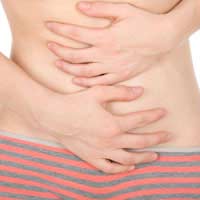E. Coli Food Poisoning

Some types of Escherichia coli (E. coli) bacteria are friendly bacteria that live in the digestive system. They do not cause disease and they carry out useful functions, keeping potential pathogens under control. However, some strains of E. coli have acquired extra genes, usually by receiving short stretches of circular DNA called plasmids from other bacteria. These extra genes code for toxins and other proteins that are described as virulence factors because they turn a friendly bacterium into an extremely pathogenic one.
Pathogenic strains of E. coli bacteria are said to be enterohaemorrhagic. Entero because they affect the digestive system and haemorrhagic because they cause bleeding. In severe cases of E. coli food poisoning, the infection causes the affected persons intestines to bleed. About 10% of people who get E. coli food poisoning also go on to develop kidney damage as a result of their infection. Very young children and elderly adults are most at risk from this condition, which is known as haemolytic uraemic syndrome.
Which Foods Carry E. coli
Any foods can become contaminated by a strain of E. coli that carries extra virulence factors but many cases of E. coli food poisoning arise from eating meat, particularly minced beef, that has been undercooked. If the meat is not cooked through completely, bacteria can survive in the centre of a beefburger or pie, and multiply in the body when consumed. It only takes 10 viable bacteria in a beefburger to be able to cause an attack of E. coli food poisoning.Since E. coli bacteria of all types are carried by ruminant animals, all meat is potentially contaminated. It is also possible, but it still thought to occur very rarely, that faecal matter from such animals can contaminate the water supply. No outbreak of E. coli food poisoning in the UK has ever been linked to water as a vector for the bacterium.
Which Strain of E. coli is Most Dangerous?
In recent years, the most feared strain of E. coli is called strain 0157. This produces a toxin known as the Shiga toxin, which is released locally to damage the cells that line the intestine. It has been responsible for some large outbreaks of food poisoning all over the world in the last decade, involving hundreds of thousands of people.What Are the Symptoms?
E. coli 0157 has a long incubation period – between one and three days. This accounts for the time that it takes bacteria to travel to the large intestine and multiply there to levels that cause problems. Because the bacteria affects the large intestine predominantly, the main symptoms are abdominal pain and diarrhoea; E. coli 0157 rarely causes vomiting, although the affected person may feel very sick. The diarrhoea is severe and becomes watery and can be speckled with fresh blood after about a day. It is rare for the body temperature to rise significantly. Unlike other forms of food poisoning, E. coli 0157 is very persistent and it takes about a week or even longer for the diarrhoea to subside, even in cases without the complications of kidney damage.Haemolytic uraemic syndrome is potentially fatal. The toxin from E. coli 0157 breaks up red blood cells, causing anaemia and a reduction in platelet count. The delicate tissues of the kidney are also affected by the toxin and there can also be neurological problems, leading to convulsions or lapses of conciousness.
In elderly people, the toxin from E. coli 0157 also leads to thrombotic thromcytopaenic purpura. This is the medical term to describe what happens when the blood inside very small blood vessels clots suddenly due to the breakdown of red blood cells and platelets. This leads to constant bruising and damage to internal organs and has a high death rate.


Re: What is C Difficile?
Kak esehiko sminor k112 typesofbacteria.co.uk
Re: What is C Difficile?
"Julia's Garland" (fr. Guirlande de Julie)
Re: Friendly Bacteria in the Digestive System
hello, thankyou for this website it was very helpful
Re: Friendly Bacteria in the Digestive System
nope im leaving now goodbye , mumm! crimble crumble ready?
Re: Friendly Bacteria in the Digestive System
The meat out of the bin is perfectly fine jackie!
Re: Friendly Bacteria in the Digestive System
Yeahhh jim not the right time were quite busy at the moment
Re: How Can People Catch Lyme Disease?
My symptoms of Lyme disease occurred in 2017, but was diagnosed in 2019. I had severe symptoms ranging from headache,…
Re: Friendly Bacteria in the Digestive System
kids
Re: Friendly Bacteria in the Digestive System
i like kids
Re: Friendly Bacteria in the Digestive System
I have yo kidz. i have the basement kids